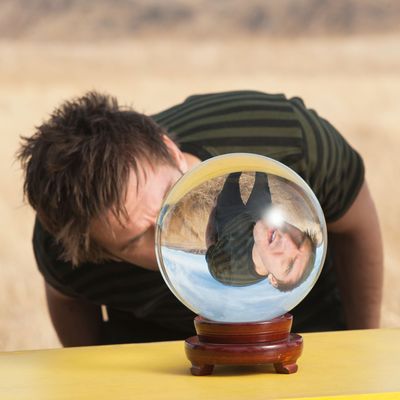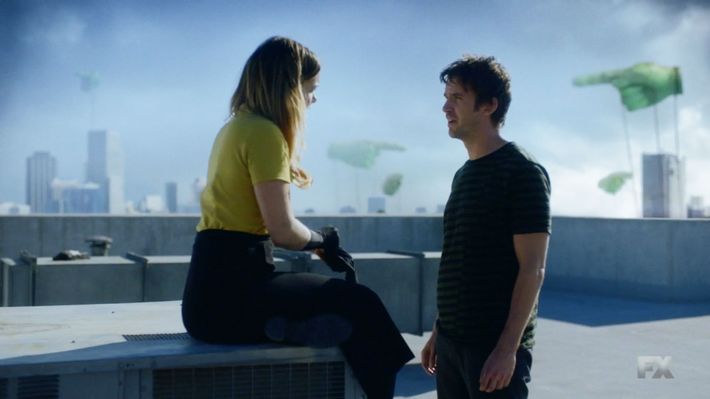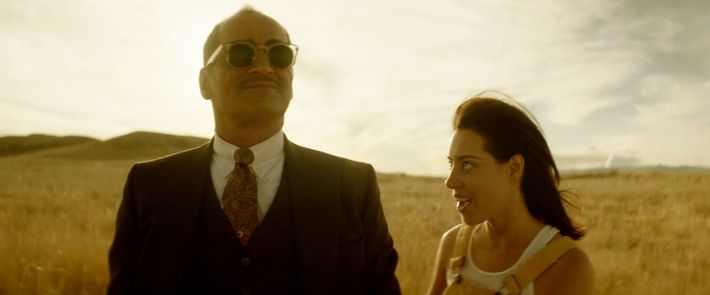
David Haller lived with the Shadow King feeding on his powers for decades, but he’s never directly encountered the psychic parasite face-to-face. That finally happens in “Chapter 10,” and after dealing with Amahl Farouk’s proxies, Oliver and Lenny, David meets his greatest enemy on the astral plane for a conversation about reality, power, and godliness. After making a brief, silent appearance in the season-one finale, Navid Negahban gets to fully assume the role of Farouk in this episode, and he plays a cocky, sinister character who wears a constant smile to show that David’s threats don’t bother him in the slightest.
Farouk sees himself as a god, and his ability to control the thoughts of others gives him control of reality because humans perceive reality with their minds. Earlier in “Chapter 10,” Jon Hamm narrated a short lesson in the differences between how animals like ticks and dogs perceive reality compared to humans: Rather than relying entirely on purely biological impulses, we form ideas about the world that are shaped by our specific environments and what we are taught by other people. If the mind dictates what is real, psychic mutants like David and Farouk have the ability to shape the world, and Farouk wants David to embrace his full potential rather than bottle up his power. Farouk quotes John Lennon and says that they’re “bigger than Jesus,” and David has to choose whether he’ll be a savior or destroyer.
David is stuck in a very precarious situation after getting out of the orb. While he’s working with Division 3 to stop Farouk, he’s also a double agent working with the villain because he was told to by the future version of his girlfriend. It’s clear that David needs to set some ground rules, and in order to do that, he needs to show Farouk that he has the power to take him on if he doesn’t listen to his demands. And with that, Legion continues to find new ways to approach superhero action: “Chapter 10” has David and Farouk engaging in a wrestling match that adds a layer of intimacy to the violence. Clad in wrestling singlets, the two men have a lot of close physical contact, and there’s an undeniable homoerotic element to this scene as they each try to dominate the other. Their wrestling match takes a turn for the spectacular as the two men transform into a samurai, a tank, and a tornado, but they eventually end up back in those singlets to emphasize the physical and mental closeness of the two characters.
Ana Lily Amirpour made a big impression with her feature film debut, A Girl Walks Home Alone at Night, and that film’s bold visual sensibility and surreal subject matter make her a strong directorial fit for Legion. This episode is full of interesting, unconventional shots, starting with the image of a rainbow spiral lollipop that becomes the top of the carousel, where David is coerced by Oliver and Lenny to create a diversion so they can invade Division 3 headquarters. They’ll ultimately kill 11 agents and turn one into a pig despite David’s insistence that no one gets hurt, and this refusal to obey is what compels David to take the fight directly to their master on the astral plane.
Amirpour uses a wide-angle lens to create a claustrophobic atmosphere for this first scene, and it’s a common theme across the episode, as David is often boxed in. He’s feeling the pressure of being a double agent, and when he joins Melanie and Syd to talk to Admiral Fukuyama about the location of Farouk’s body, David’s face is framed by images of the Vermillion androids who accuse him of deceiving Division 3. When David eventually tells Syd about the message from her future self, they are on a roof where giant green hands float above the skyline behind them, and those hands point at David’s head to keep that extra pressure on him while he’s in an open-air space.

One of my favorite camera-blocking moments in “Chapter 10” occurs during Lenny’s conversation with Farouk, as she tries to convince him to create a new body for her so he can set her mind free. The camera reflects Lenny’s fidgety disposition by shifting left and right, and as the camera moves, Farouk’s head drifts in front of the sun. This ties directly to Farouk’s earlier comment that he is the sun and moon, and this idea is visualized by having his head eclipse the sun.

Meanwhile, David breaking through space and time to communicate with Future Syd gives Amirpour the opportunity to push the visual experimentation. David does so with a spherical chamber (perhaps a precursor to the orb sent from the future?), which becomes a space of extreme distortion and vibrant light patterns. David’s face stretches and shrinks as his psychic powers are amplified, and the lights are a graphic representation of the synapses firing around his brain. I don’t think we’re meant to believe an elaborate lighting system exists inside the chamber, and I appreciate that Legion takes advantage of technical elements to inform the storytelling in more abstract ways.
Once David successfully projects his consciousness into the future, the editing becomes very jerky to show how he’s been displaced from time. (It’s an unsettling effect, and it made me feel like I was in an altered state as I watched David jitter his way through the conversation.) Syd is cagey when she sees her ex-lover, and while she gives him tidbits of information — in her timeline, David kills Farouk about a week from the present day — the greater details of her current circumstances are vague. David asks her if he’s dead in the future, to which she replies, “It’s complicated,” and she refuses to tell him about whatever it is that killed off most of the population. I predict that’s because David himself is responsible, and the reason Syd needs him to help Farouk find his body is because Farouk is the only person powerful enough to stop David when he goes to the dark side.
David goes to his old mentor, Melanie, for some guidance after his journey to the future and his astral showdown with Farouk, and she suggests that he get the hell out of there and try to find a way to live a quiet life of solitude with Syd instead of saving the world. Jean Smart is getting short shrift this season, as Melanie spends yet another episode getting high and reciting dusty platitudes like, “We all die eventually. The real tragedy is forgetting to live.” Melanie has changed a lot in the past year, and she’s an example of how a time jump can hurt a character. I understand why she’d have a massive breakdown after regaining Oliver only to lose him again, but because that deterioration happened offscreen, it’s difficult to emotionally connect to her new status quo. Smart is playing Melanie’s despair well, but she comes across as a tangential character this season (so far, at least) instead of being an active presence in the plot.
I’m far more interested in where the show is going with Cary and Kerry. Farouk’s attack at the start of the episode changes how their powers work, with Cary now getting absorbed into Kerry’s body instead of the other way around. It takes a powerful shared memory to set Cary free, but he’s reluctant to try the absorption again until he’s positive it will work the way it should. Kerry isn’t down with this at all: She doesn’t want to be out in the world all the time, living every mundane moment like everyone else. That’s tough for Kerry, but I’m excited to see Amber Midthunder have an opportunity to spend more time interacting with other members of the cast. Theme-wise, this development also allows the writers to explore the isolation and social anxiety of a character who has kept herself closed off from everyone except the person with whom she literally shares a body. It aligns Kerry with David, and now they both have to figure out how to move forward after being cut off from their symbiotic relationships.

